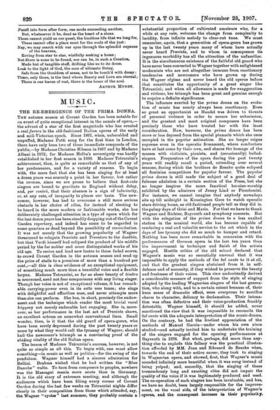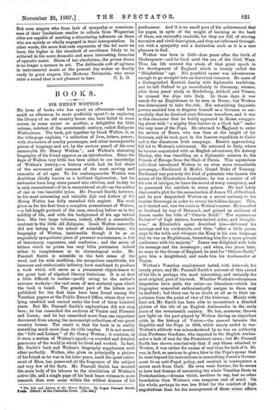MUSIC.
THE RE-EMERGENCE OF THE PRIMA. DONNA. THg autumn season at Covent Garden has been notable for an event of quite exceptional interest in the annals of opera,— the advent of a star of the first magnitude who has created a real furore in the old-fashioned Italian operas of the early and mid-Victorian epoch. Since 1861, when, unheralded and unpuffed, Madame Patti sang for the first time in London, there have only been two of these immediate conquests of the public,—by Madame Christine Nilsson in 1867 and by Madame Albani in 1872; for Madame Melba's sovereignty was hardly established in her first season in 1888. Madame Tetrazzini's achievement, then, is quite as remarkable as that of any of her predecessors, and for a variety of reasons. To begin with, the mere fact that she has been singing for at least a dozen years was scarcely a point in her favour, but rather the reverse, since we are prone to believe that first-rate singers are bound to gravitate to England without delay, and, per contra., that their absence is a sign of inferiority, or, at any rate, of incapacity to please our taste. The new- comer, however, has had to overcome a still more serious obstacle in her choice of roles, for instead of electing to be heard in the more modern or fashionable works, she has deliberately challenged attention in a type of opera which for the last dozen years has been steadily dropping out of the Covent Garden repertory, and indeed has come to be regarded in some quarters as dead beyond the possibility of resuscitation. It was not merely that the growing popularity of Wagner threatened to relegate Traviata and Trovatore to the dustbin, but that Verdi himself had eclipsed the product of his middle period by the far nobler and more distinguished works of his old age. To revive and lend new lustre to these faded scores, to crowd Covent Garden in the autumn season and send up the price of stalls to a premium of more than a hundred per cont.,—all this is clear evidence of an exceptional equipment, of something much more than a beautiful voice and a flexible larynx. Madame Tetrazzini, so far as sheer beauty of timbre is concerned, need not fear comparisons with any living singer. Though her voice is not of exceptional volume, it has remark. able ,carrying-power even in its sotto voce tones; she sings with delightful and effortless ease, and never attempts more than:she can perform. She has, in short, precisely the endow- ment and the technique which render the most trivial vocal frippery not merely endurable but engaging. She is, more- over, as her performance in the last act of Traviata shows, an excellent actress on somewhat conventional lines. Small wonder, then, is it that the old guard of opera-goers, who have- been sorely depressed during the past twenty years or more by what they would call the tyranny of Wagner, should hail-the newcomer's triumph as a convincing proof of the abiding vitality of the old Italian opera.
The lesson of Madame Tetrazzini's success, however, is not quite so simple as all this. To begin with, one must allow something—in music as well as politics—for the swing of the pendulum. Wagner himself had a sincere admiration for Bellini. Brahms wished that he had written the "Blue Danube" waltz. To turn from composers to peoples, nowhere was -the Maacagni mania more acute than in Germany.
It is the old story of extremes meeting, and although the audiences which have been filling every corner of Covent
Garden during the last few weeks on Tetrazzini nights differ clearly in their composition from those which attended, say, the. Wagner " cycles " last summer, they probably contain a substantial proportion of cultivated amateurs who, for a while at any rate, welcome the change from complexity to
lucidity, from infinite melody to clear-cut tune. We must remember, again, that a generation of opera-goers has grown up in the last twenty years many of whom have actually never heard Traviata, and to whom in consequence its ingenuous morbidity has all the attraction of the unfamiliar.
It is the simultaneous existence of the faithful old guard who have never been converted to Wagner together with enlightened modernists who are not altogether immune from reactionary tendencies and newcomers who have grown up during the Wagner regime and never beard the old operas before that constitutes the opportunity of a great singer like Tetrazzini; and when all allowance is made for exaggeration and reclame, her triumph has been great and genuine enough to acquire a definite significance.
The influence exerted by the prima donna on the evolu- tion of music has nearly always been reactionary. Even so great an opportunist as Handel was driven to threats of personal violence in order to secure her submission, and the greatest and most original composers have been precisely those who have treated her with the least consideration. Now, however, the prima donna has been more or less deposed from the special pinnacle which she once occupied in the popular estimation. She no longer reigns supreme even in the operatic firmament, where conductors have at last come by their own, and shares the homage of the masses with violinists, pianists, and (occasionally) ballad- singers. Frequenters of the opera during the past twenty years will readily recall a period, extending over several seasons, during which the brothers de Reszke quite eclipsed all feminine competitors for popular favour. The popular prima donna is still made the subject of a good deal of fulsome adulation in a certain section of the Press, but she no longer inspires the same fanatical heroine-worship exhibited by the admirers of Jenny Lind or Piccolomini.
For instance, we cannot imagine that anybody nowadays sits up till midnight in Kensington Gore to watch operatic stars driving home, as old-fashioned people tell us they did in the palmy days of Grisi and Mario. For that we have to thank Wagner and Richter, Bayreuth and symphony concerts. But with the relegation of the prima donna to a less exalted station in the musical world, she has become capable of rendering a real and valuable service to the art which in the days of her tyranny she did so much to hamper and retard.
Nothing has been more remarkable in connexion with the performances of German opera in the last ten years than the improvement in technique and finish of the artists engaged. Hostile critics of the old school declared that Wagner's music was so essentially unvocal that it was impossible to apply the methods of the bel canto to it at all, and that the greatest singers abstained from it in self- defence and of necessity, if they wished to preserve the beauty and freshness of their voices. This view undoubtedly derived a considerable measure of support from the style of singing adopted by the leading Wagnerian singers of the last genera- tion, who along with, and to a certain extent because of, their keen sense of dramatic effect, were overprone to sacrifice charm to character, delicacy to declamation. Their intona- tion was often defective and their voice-production frankly detestable. Wagner himself, it should be added, never sanctioned the view that it was impossible to reconcile the bel canto with the adequate interpretation of the music-drama.
On the contrary, he had the liveliest appreciation of the methods of Manuel Garcia—under whom his own niece studied—and actually invited him to undertake the training of the singers engaged for the opening performances at Bayreuth in 1876. But what, perhaps, did more than any- thing else to explode this fallacy was the practical illustra-
tion afforded by MM. Jean and Edouard de Reszke when,
towards the end of their active career, they took to singing in Wagnerian opera, and showed, first, that Wagner's music sounded infinitely more beautiful when it was sung instead of being yelped; and, secondly, that the singing of these tremendously long and exacting roles did not impair the
quality of the voice if it was legitimately produced and used. The co-operation of such singers has been invaluable, and has, we have no doubt, been largely responsible for the improve- ment, on the vocal side, of the interpretation of Wagner's operas, and the consequent increase in their popularity. Ent even singers who from lack of sympathy or conscious- ness of their limitations resolve to refrain from Wagnerian roles are capable of exerting a stimulating influence on those who are mainly or wholly engaged in their interpretation. In other words, the more first-rate exponents of the bel canto we have, the higher is the standard of excellence likely to be achieved in the more dramatic and more interesting branches of operatic music. Shorn of her absolutism, the prima donna is no longer a menace to art. The deliberate cult of ugliness in instrumental music at the present day makes us doubly ready to greet singers, like Madame Tetrazzini, who never
utter a sound that is not pleasant to hear. C. L. G.



















































 Previous page
Previous page